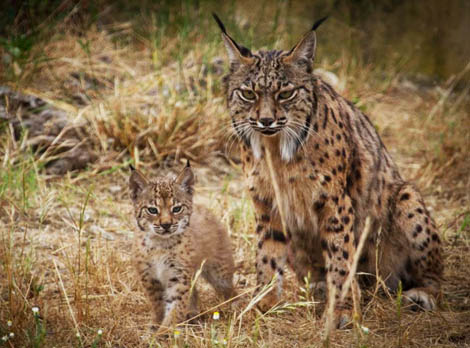 The collaboration between olive growers and the LIFE Habitat Lince Abutre Project allowed the creation of more than 55 hectares of ecological corridors to promote the connection between areas of favorable habitat for the Iberian lynx in the Adiça and Ficalho mountains, in the region of Moura, Alentejo, actively contributing to the conservation of this species in Portugal.
The collaboration between olive growers and the LIFE Habitat Lince Abutre Project allowed the creation of more than 55 hectares of ecological corridors to promote the connection between areas of favorable habitat for the Iberian lynx in the Adiça and Ficalho mountains, in the region of Moura, Alentejo, actively contributing to the conservation of this species in Portugal.
According to those responsible for LIFE Habitat Lince Vulture Project, "it was agreed with the region's olive growers that, in certain parts of their olive groves, no interventions are carried out that harm the development and regeneration of natural vegetation, such as olive harvesting".
On the other hand, for the consequent loss of profitability, «these farmers receive from the LIFE Habitat Lince Abutre Project a compensatory payment for each hectare of olive grove allocated to the implementation of these corridors».
The recovery of vegetation in these areas, previously selected, will “increase the connectivity of the landscape suitable for the Iberian lynx, thus facilitating its movement in this region”.
Simultaneously, “the areas favorable to the existence of wild rabbits (as well as other species of smaller game) are also increasing, prey to this threatened feline and which can constitute an important economic resource for rural areas”.
With all this, those responsible for project they say they hope that "in the medium term this innovative measure will contribute to the recovery of the Iberian lynx in the region".
The LIFE Habitat Lince Abutre project is coordinated by the League for the Protection of Nature (LPN) and has a partnership with several public and private institutions, namely the Iberian Avifauna Study Center (CEAI), the National Association of Rural Owners, Management Hunting and Biodiversity (ANPC), the Association of Young Farmers of Moura (AJAM), the Directorate-General for Food and Veterinary Medicine (DGAV), the Institute for Nature and Forest Conservation (ICNF) and the Center for Research and Social Intervention (CIS / ISCTE-IUL).
This project is 75% co-financed by the LIFE-Nature Program of the European Commission.


















Comments